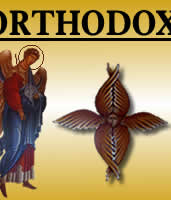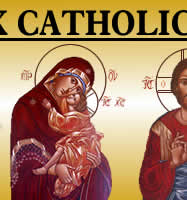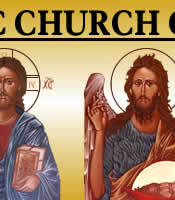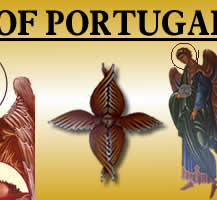son to the Monastery of the Holy Dormition in Puhtica and to the Holy Dormition Monastery of the Caves in Pskov. In the late 1930s they made two pilgrimages to the Valaam Monastery of the Transfiguration of Our Lord on Lake Ladoga.
These pilgrimages largely determined the spiritual way of life of the future Patriarch. From his early childhood Alexey Ridiger served in the church under the guidance of his spiritual father Archpriest Ioann Bogoyavlensky, later Bishop of Tallinn and Estonia (+1949); from 1944 to 1947 was senior subdeacon of Archbishop Pavel (Dmitrievsky) of Tallinn and Estonia (+1946) and later of Bishop Isidor.
Alexey Ridiger studied at the Russian secondary school in Tallinn. In 1945 subdeacon Alexey was instructed to prepare the Cathedral of St.Alexander Nevsky in Tallinn for opening so that divine services could be resumed there (the Cathedral was closed during the wartime occupation).
From May 1945 to October 1946 he was an altar boy and sacristan of the Cathedral. From 1946 he served as psalm-reader in St.Simeon's Church and from 1947 - in the Church of the Kazan Icon of the Mother of God in Tallinn.
He entered the Leningrad (now St.Petersburg) Theological Seminary and graduated from it with honours in 1949. When a student of the Leningrad (now St.Petersburg) Theological Academy, Alexey Ridiger was ordained deacon on 15 April 1950 and priest on 17 April and appointed Rector of the Church of the Theophany in Johvi, Tallinn diocese.
In 1953 Fr. Alexey graduated from the Theological Academy with honours and with the degree of the Candidate of Theology.
On 15 July 1957 Fr.Alexy was appointed Rector of the Cathedral of the Dormition in Tallinn and Dean of the Tartu district. On 17 August 1958 he was elevated to the rank of archpriest. On 30 March 1959 he was appointed Dean of the united Tartu-Vilyandis deanery of the Tallinn diocese.
On 3 March 1961 he took his monastic vows in the Trinity Cathedral of the Laura of the Holy Trinity and St.Sergius. On 14 August 1961 hieromonk Alexy was nominated Bishop of Tallinn and Estonia and entrusted with temporary administration of the Riga diocese.
On 21 August 1961 hieromonk Alexy was elevated to the rank of Archimandrite. On 3 September 1961 Archimandrite Alexy was consecrated Bishop of Tallinn and Estonia in the Cathedral of St. Alexander Nevsky in Tallinn.
On 14 November 1961 Bishop Alexy was appointed deputy chairman of the Department for External Church Relations of the Moscow Patriarchate. On 23 June 1964 Bishop Alexy was elevated to the rank of Archbishop.
On 22 December 1964 Archbishop Alexy was appointed Chancellor of the Moscow Patriarchate and became permanent member of the Holy Synod. He was Chancellor till 20 July 1986.
On 7 May 1965 Archbishop Alexy was appointed Chairman of the Education Committee. Archbishop Alexy was a member of the Holy Synod Commission on Christian Unity and Interchurch Relations from 17 October 1963 to 1979.
On 25 February 1968 Archbishop Alexy was elevated to the rank of Metropolitan. From 10 March 1970 to 1 September 1986 he supervised the Pensions Committee, the task of which was to provide pensions to the clergy and employees of the church organizations, as well as to their widows and orphans.
On 18 June 1971 in consideration of his assiduous work for the carrying out of the Local Council of the Russian Orthodox Church of 1971 Metropolitan Alexy was honoured with the right of wearing the second panagia.
Metropolitan Alexy performed executive functions as a member of the Commission for the Preparation and Execution of the 50th (1968) and 60th (1978) anniversary of the Revival of the Patriarchal Office in the Russian Orthodox Church, a member of the Holy Synod Commission for the Preparation of the Local Council of the Russian Orthodox Church of 1971, chairman of its Procedural and Organizational Group and chairman of the Secretariat of the Local Council.
From 23 December 1980 he was deputy chairman of the Commission for the Preparation and Execution of the Celebration of the Millennium of the Baptism of Russia and chairman of the Organizational Group of the Commission, and chairman of the Theological Group from September 1986.
On 25 May 1983 he was appointed chairman of the Executive Commission for the Transfer of the Danilov Monastery, organization and execution of all works for its restoration and construction of the Spiritual and Administrative Centre of the Russian Orthodox Church on its territory. He retained this post till his appointment to the Leningrad (now St. Petersburg) See. On 29 June 1986 he was appointed Metropolitan of Leningrad and Novgorod and entrusted with the administration of the Tallinn diocese.
On 7 June 1990 he was elected to the Moscow Patriarchal Throne at the Local Council of the Russian Orthodox Church. The enthronement was held on 10 June 1990.
Activities of Metropolitan Alexy on the international scene: as a member of the delegation of Russian Orthodox Church - participant in the 3rd Assembly of the World Council of Churches (WCC) in New Delhi (1961); a member of the WCC Central Committee (1961- 68); president of the World Conference 'Church and Society' (Geneva, Switzerland, 1966); member of the WCC Commission on Faith and Order (1964-68). As head of the Russian Orthodox Church delegation participated in theological talks with the delegation of the Evangelical Church in Germany 'Arnoldshain-II' (FRG, 1962), theological talks with the delegation of the Union of the Evangelical Churches in GDR 'Zagorsk-V' (the Laura of the Holy Trinity and St.Sergius, 1984), theological talks with the Evangelical Lutheran Church of Finland in Leningrad and in Puhtica Monastery (1989). More than twenty-five years Metropolitan Alexy laboured in the Conference of European Churches (CEC).
In 1964 Metropolitan Alexy was elected a CEC president (member of the Presidium) and was several times re-elected at the CEC general assemblies. From 1971 - vice-president of the CEC Presidium and Advisory Committee. On 26 March 1987 he was elected chairman of the CEC Presidium and Advisory Committee.
At the 8th CEC General Assembly on Crete (1979) Metropolitan Alexy was the keynote speaker on 'In the Power of the Holy Spirit - to Serve the World'. From 1972 Metropolitan Alexy was a member of the Joint Committee of the Conference of European Churches and the Council of Bishops' Conferences of Europe (CBCE) of the Roman Catholic Church. On 15-21 May 1989 in Basel, Switzerland, Metropolitan Alexy was co-chairman of the First European Ecumenical Assembly 'Peace with Justice' organized by CEC and CCEE.
In September 1992 at the 10th CEC Assembly the term of Patriarch Alexy II as CEC chairman expired. His Holiness made a report at the Second European Ecumenical Assembly in Graz, Austria, in 1997. Metropolitan Alexy was an initiator and chairman of the four seminars of the Churches of the Soviet Union - members of CEC and the Churches, which maintained cooperation with this regional Christian organization.
The seminars were held in the Puhtica Monastery of the Dormition in 1982, 1984, 1986 and 1989. Metropolitan Alexy took an active part in the work of international and national peace public organizations. From 1963 he was a member of the Board of the Soviet Peace Foundation, a participant of the constituent meeting of the 'Rodina' (Motherland) Society, at which he was elected member of the Society Board on 15 December 1975; re-elected on 27 May 1981 and on 10 December 1987.
On 24 October 1980 at the 5th All-Union Conference of the Soviet-Indian Friendship Society was elected its vice-president. On 11 March 1989, he was elected a member of the Board of the Slavonic Literature and Slavonic Cultures Foundation. He was a delegate of the World Christian Conference 'Life and Peace' in Uppsala, Sweden (20-24 April 1983) and elected one of its presidents.
From 24 January 1990 - member of the Board of the Soviet Charity and Health Foundation; from 8 February 1990 - a member of the Presidium of the Leningrad Culture Foundation. In 1989 he was elected people's deputy of the USSR on behalf of the Charity and Health Foundation.
Co-chairman of the Russian Organizational Committee for the Millennium Celebrations (1998-2000). An Interconfessional Conference 'Christian Faith and Human Enmity' was held in Moscow in 1994 on the initiative and with the participation of His Holiness Patriarch Alexy II. His Holiness chaired the Conference of the Christian Interconfessional Consultative Committee ''Jesus Christ is the Same Yesterday and Today and for Ever' (Heb 13:8).
Christianity on the Threshold of the Third Millennium' (1999) and the Interreligious Peace Forum (Moscow, 2000).
His Holiness Patriarch Alexy was an honourary member of the St.Petersburg and Moscow Theological Academies and the Orthodox Academy on Crete, Greece; Doctor of Theology of the St.Petersburg Theological Academy (1984); Doctor of Theology honoris causa of the Theological Academy in Debrecen of the Reformed Church in Hungary and of the Jan Amos Komensky Theological Faulty in Prague; Doctor of Theology honoris causa of the General Seminary of the Episcopal Church in the USA (1991); Doctor of Theology honoris causa of St.Vladimir's Theological Seminary (Academy) in the USA (1991); Doctor of Theology honoris causa of St.Tikhon's Theological Seminary in the USA (1991). In 1992 elected full member of the Russian Academy of Education. Doctor of Theology honoris causa of the 'Alaska Pacific' University in Anchorage, Alaska, USA (1993). Prize winner of the A.Ye. Kulakovsky State Award of the Republic of Sakha (Yakutia) 'For Outstanding Zealous Activity in the Consolidation of the Peoples of the Russian Federation' (1993).
That same year His Holiness was given the degree of honorary professor of the Omsk State University for outstanding services to culture and education and honorary professor of the Moscow State University for outstanding services to the spiritual revival of Russia. 1994: Honorary Doctor of Philology of the St.Petersburg University (January 24) and Honorary Doctor of Theology of the Theological Faculty of the Serbian Orthodox Church in Belgrade (May 15). Honorary Doctor of Theology of the Tbilisi Theological Academy (Georgia, 1996); honorary member of the Public Supervisory Council for the Revival of the Christ the Saviour Cathedral.
He was awarded the highest award of the Russian Federation - the Order of St. Apostle Andrew the First-Called, Order 'For Services to the Fatherland', many orders of the Local Orthodox Churches, state orders of different countries and awards of public organizations.
In 2000 His Holiness the Patriarch was elected an honorary citizen of Moscow. He was an honorary citizen of St.Petersburg, Novgorod the Great, Republic of Mordovia, Republic of Kalmykia, the cities of Sergiev Posad and Dmitrov.
His Holiness was awarded with the national prizes 'Man of the Year', 'Outstanding People of the Decade (1990-2000) Promoting Prosperity and Fame of Russia', 'Russian National Olympus' and honorary public title 'Man of the Epoch'.
His Holiness the Patriarch was the prizewinner of the international prize 'Perfection. Good. Glory' awarded by the Russian Biographical Institute (2001) and the main prize 'Person of the Year' awarded by the 'Top Secret' Holding (2002).
His Holiness Patriarch Alexy was the Chairman of the Patriarchal Synodal Bible Commission, editor-in-chief of the 'Orthodox Encyclopaedia' and Chairman of the Supervisory and Church Scholarly Council for the publication of the 'Orthodox Encyclopaedia', chairman of the Board of Trustees of the Russian 'Reconciliation and Accord' Charity Foundation and the head of the Board of Trustees of the National Military Foundation.
Throughout the years of his episcopal ministry Metropolitan Alexy visited many dioceses of the Russian Orthodox Church and many countries of the world, attending many church events.
Several hundred of his articles, presentations and works on theological, church and historical, peace and other topics were published in the church and secular press in Russia and abroad.
His Holiness Patriarch Alexy headed the Bishops' Councils of 1992, 1994, 1997 and 2000 and has always chaired the sessions of the Holy Synod. As the Patriarch of All Russia he has visited 81 dioceses, many of which several times.
Altogether he made 120 visits to the dioceses, primary objective of which was the pastoral care for distant communities, strengthening the unity of the church and bearing Church witness in society.
Throughout his episcopal ministry His Holiness Patriarch Alexy presided at 83 episcopal consecrations (more than 70 after his election to the Patriarchal Throne), ordained more than 400 priests and almost an equal number of deacons.
His Holiness Patriarch Alexy paid great attention to the training of clergy for the Russian Orthodox Church, to the religious education of laymen and to the spiritual and moral education of the younger generation. For this purpose with the blessing of His Holiness the Theological seminaries, Theological colleges, and parish schools have been opened and structures for the development of religious education and catechization have been put in place.
By 1995 it was already possible for the Church to re-establish its mission work. His Holiness paid great attention to building new relationship between the State and the Church in Russia. He adheres with conviction to the principle of separation between the mission of the Church and the functions of the state and of non-interference in the affairs of each other.
At the same time he believed that the salutary ministry of the Church and the ministry of the state to society demand mutually free cooperation between the church, state and public institutions.
After many years of persecution and restriction the Church has regained the opportunity to carry out catechetical and religious-educational activity in society and also to carry out charitable work for the needy, in hospitals, homes for the elderly and prisons.
The pastoral approach of His Holiness Patriarch Alexy removes tension caused by unjustified fears and narrow corporate or particular interests between state institutions, responsible for the preservation of the monuments of culture, and the Church.
His Holiness has signed several joint documents with the Ministry of Culture of the Russian Federation and with the leadership of several museums located on the territory of the monasteries, which have ecclesiastical, historical and spiritual importance.
These agreements resolve the afore-mentioned problems and give new life to the monasteries. His Holiness Patriarch Alexy called for close cooperation among representatives of all spheres of secular and church culture. He was constantly reminding of the necessity to revive morality and spiritual culture, to overcome artificial obstacles between secular and religious cultures and between secular science and religion.
A number of joint documents signed by His Holiness had laid a foundation for the development of cooperation of the Church with health and social security systems, the armed forces, law enforcement, justice and culture institutions, and other state structures. An well-organized church system of care for servicemen and personnel of law enforcement bodies was set up with the blessing of His Holiness Patriarch Alexy II.
Throughout the period of political, social and economic reforms His Holiness Patriarch Alexy had constantly reminded people of the priority of moral aims over others, of the preference of the ministry to the good of society and concrete people in political and economic activities.
His Holiness Patriarch Alexy II of Moscow and All Russia continued the tradition of Christian peace service in the period of social and political crisis in Russia in autumn 1993, fraught with the threat of civil war and undertook the mission of calming political passions by inviting the conflicting parties to negotiations and being a mediator at them. The Patriarch put forward many peace initiatives in connection with the conflict in the Balkans, the Armenian-Azerbaijani confrontation, hostilities in Moldavia, events in the North Caucasus, the situation in the Middle East, military operation against Iraq, etc.
Many new dioceses have been established throughout the years of the Patriarchal ministry of the present Primate of the Russian Orthodox Church. Thus many centres of spiritual and church administrative leadership emerged, which are located closer to the parishes and promote the revival of church life in the remote areas.
As the ruling bishop of Moscow, His Holiness Patriarch Alexy II paid a lot of attention to the revival and development of life within the dioceses and parishes. This work has become the pattern for the structuring of diocesan and parish life in other places.
The Primate of the Russian Orthodox Church tirelessly worked for the building up of church life and called upon all members of the Church without any exception to participate in it more actively and responsibly on conciliar basis.
He paid great attention to the problems of fraternal cooperation among all Orthodox Churches in common witness to the Truth of Christ to the world.
His Holiness considered cooperation among different Christian confessions for the sake of meeting the needs of the modern world as a Christian obligation and as a way of fulfilling the commandment of Christ on unity, peace and accord in society, to which Patriarch Alexy constantly appealed.
|







